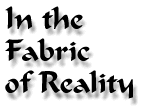  |
 |
|
  |
||
 Roleplaying adventure awaits beyond the portal… |
||
Month: December 2015

 |
Introduction You have a friend at school who tells you she can’t go out on Saturday because she’s “gaming”. You ask her if she means Monopoly or poker or something like that and she tells you that no, she’s “roleplaying — it’s sort of like Dungeons and Dragons”. You’ve heard stories about kids worshipping the devil or committing suicide because of games like that, so naturally you’re concerned. You have a friend at school who tells you she can’t go out on Saturday because she’s “gaming”. You ask her if she means Monopoly or poker or something like that and she tells you that no, she’s “roleplaying — it’s sort of like Dungeons and Dragons”. You’ve heard stories about kids worshipping the devil or committing suicide because of games like that, so naturally you’re concerned. Or maybe you’re a parent and your twelve-year-old son has just come home from a weekend at his friend’s house raving about a neat new game his friend’s older brother introduced him to in which there is no board, no cards and very few rules but lots of strange dice. All the action takes place in your imagination, he tells you, and he was playing a priest of the god Essun or something like that and he used spells to kill evil monsters. You’ve heard of something like this involved with psychopathic killers so you’re genuinely concerned about your child. Or maybe you’re a parent and your twelve-year-old son has just come home from a weekend at his friend’s house raving about a neat new game his friend’s older brother introduced him to in which there is no board, no cards and very few rules but lots of strange dice. All the action takes place in your imagination, he tells you, and he was playing a priest of the god Essun or something like that and he used spells to kill evil monsters. You’ve heard of something like this involved with psychopathic killers so you’re genuinely concerned about your child. Or maybe you’ve been playing roleplaying games (RPGs) for a little while and your parents are asking a lot of questions that you’re not prepared to answer. Or maybe you’ve been playing roleplaying games (RPGs) for a little while and your parents are asking a lot of questions that you’re not prepared to answer. That is what this Uncle Figgy’s Guide is for: To allay your fears about your friend’s well-being or your child’s mental health, or to help you discuss the nature of RPGs with your family and friends. That is what this Uncle Figgy’s Guide is for: To allay your fears about your friend’s well-being or your child’s mental health, or to help you discuss the nature of RPGs with your family and friends.
A Note to Parents A Note to Gamers Dragon Dog Press, the Dragon Dog Press logo, Uncle Figgy, Uncle Figgy’s Realm and Uncle Figgy’s Guides are trademarks of Dragon Dog Press, Inc., all rights reserved. The Copekey logo, Keylock logo, and Copekey gemstones are trademarks of Dan Cope. Some images and all copy on this page are copyright © 2004 Dragon Dog Press, Inc. The Uncle Figgy’s Guides may be freely distributed so long as proper notice of copyright is provided. |
Uncle Figgy’s Guide to Role Playing for non-roleplayers
 Uncle Figgy’s Realm  Introduction Introduction A Note to Parents A Note to Parents A Note to Gamers A Note to Gamers Roleplaying At Its Simplest Roleplaying At Its Simplest How RPGs Work How RPGs Work Arbitration and Mediation Arbitration and Mediation Cooperative Storytelling Cooperative Storytelling What the Player Does What the Player Does Putting It All Together Putting It All Together An Example Game An Example Game Roleplaying and Maturity Roleplaying and Maturity Roleplaying and Escapism Roleplaying and Escapism Roleplaying and Time & Money Roleplaying and Time & Money Roleplaying and Personality Roleplaying and Personality Roleplaying and The Occult Roleplaying and The Occult Roleplaying and Violence Roleplaying and Violence Case Studies Case Studies Roleplaying Types Roleplaying Types Some Gaming Terms Some Gaming Terms For More Information For More Information |
 |
 |

|
Uncle Figgy’s Guides
What are Uncle Figgy’s Guides?
German
Russian
Portugese
|

